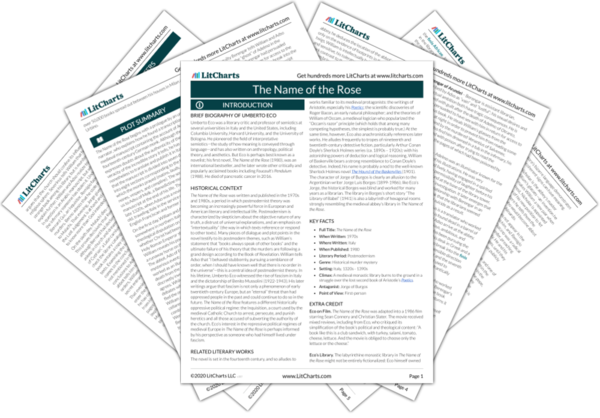Venantius is a translator who worked in the scriptorium with Adelmo. He is found dead in a barrel of pig’s blood the day after William and Adso arrive at the abbey. Like Adelmo, he was intellectually curious, ambitious, and frequently argued with Jorge. He had also been pursuing the forbidden book. William finds notes on his desk in Greek and a zodiacal language relating to his attempt to break into the finis Africae, including the seemingly incomprehensible direction that “the hand over the idol works on the first and the seventh of the four.” He died from the poison Jorge had used to contaminate the pages of the manuscript, after frantically reading through the forbidden book.
Get the entire The Name of the Rose LitChart as a printable PDF.

Venantius of Salvemec Character Timeline in The Name of the Rose
The timeline below shows where the character Venantius of Salvemec appears in The Name of the Rose. The colored dots and icons indicate which themes are associated with that appearance.
First Day
William and Adso also meet Berengar of Arundel, Malachi’s assistant. They also meet Venantius of Salvemec, a translator, and Benno of Uppsala, a rhetorician. Malachi explains that the library...
(full context)
...taking pleasure in the “monsters he painted,” and of following the “path of monstrosity” himself. Venantius speaks up and defends Adelmo, revealing that Jorge had debated with Adelmo on the topic...
(full context)
Venantius persists, however, insisting that Berengar had also participated in the conversation. Berengar also denies remembering;...
(full context)
Second Day
After morning prayers, Venantius’s dead body is found in a barrel of pig’s blood. Severinus determines that the cause...
(full context)
...interaction that occurred in the scriptorium a few days earlier. During the argument about laughter, Venantius mentioned that Aristotle had dedicated the second book of his Poetics to comedy, but that...
(full context)
William tries to examine Venantius’s desk for evidence, but is warded off by Benno, who asks to speak with him....
(full context)
...He predicts that the Apocalypse is at hand, and that the deaths of Adelmo and Venantius were “sounding the trumpets” before the Last Judgment. William and Adso pass through the chapel...
(full context)
Third Day
After this conversation, William manages to decipher Venantius’s code, which reads “The hand over the idol works on the first and the seventh...
(full context)
Fourth Day
...the corpse, Severinus confirms that Berengar died of drowning. He also suggests that Berengar and Venantius might have touched the same poisonous substance, since both their fingers are black and Berengar’s...
(full context)
...that he used to be a follower of Dolcino. He confesses that the night that Venantius died, he came into the kitchen for his assignation with one of the village girls...
(full context)
...his new lenses. With his two pairs of glasses, William deciphers the Greek portion of Venantius’s manuscript, but the words make no sense and seem “the ravings of a madman.” However,...
(full context)
Fifth Day
...the Book of the Apocalypse: hail (Adelmo fell from the tower of the Aedificium), blood (Venantius died of poison), water (Berengar died of drowning), and now the stars (Severinus was killed...
(full context)
Sixth Day
...know Greek and Arabic. William observes to Adso that everyone who has died with blackened fingers—Venantius, Berengar, and Malachi—knew Greek, so the next victim will probably know it as well. He...
(full context)
...asks Benno whether anyone mentioned the Coena in the discussion about riddles. Benno confirms that Venantius did, and Jorge became furious, reminding everyone that the book had been forbidden by the...
(full context)
...first and seventh of four, but of the four, the word four. They now understand Venantius’s riddle and the secret of entering the finis Africae: one must press the fourth and...
(full context)
...to the finis Africae by pressing the “q” and “r” in the word “quatuor,” as Venantius wrote in his notes. The frame of the mirror shudders and the glass surface snaps...
(full context)
Seventh Day
...the deadly poison from the infirmary and poisoned the pages of the book which killed Venantius, Berengar, and Malachi (explaining their blackened fingers and tongues). He convinced Malachi to murder Severinus...
(full context)
...with his tongue in order to detach one page from the next. This was how Venantius died, then: he broke into the finis Africae, and found the forbidden book. When he...
(full context)
Berengar found Venantius’s body but didn’t know what to do, fearing there would be an inquiry, since after...
(full context)
...of the Poetics. William explains that he recognized some of the seemingly nonsensical phrases in Venantius’s notes—“cicadas that will sing from the ground,” for example—as phrases from the first book of...
(full context)












